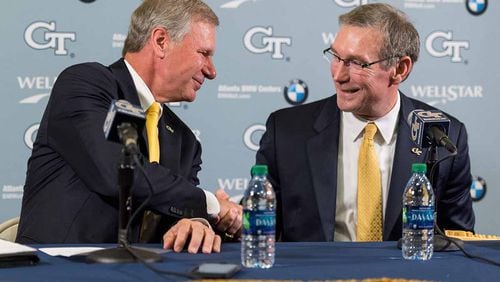To the circle of leaders in college athletics who believe that athletes should be able to profit from the use of their name, image and likeness, add Georgia Tech athletic director Todd Stansbury. With a caveat.
“I’m not against student-athletes being able to use their likeness, or whatever the terminology is, but I wouldn’t want to do it until we were able to ensure that we would protect it from abuse,” Stansbury told the AJC.
The issue of whether college athletes can be compensated apart from their scholarship for what is known as NIL (name, image and likeness) has come to the forefront in college athletics. For example, proponents believe that a college athlete should be able to sell his or her autograph or be paid to endorse a brand of apparel. NCAA rules prohibit athletes from being compensated for such activities.
Stansbury positioned himself as being OK with that possibility, and more concerned with the logistics of it.
“My big thing is, how do we make sure that it doesn’t get abused,” he said. “And that to me, I think, is the thing that concerns me the most, is how do we ensure that some big donor isn’t behind the fact that this kid just got (an exorbitant sum of money) signing his autograph, and those types of things.”
Support for what is termed the Olympic model has grown. While NCAA president Mark Emmert testified in 2014 in a federal trial his objections to college athletes profiting from name, image and likeness, he said in March that the Olympic model is “well deserving of serious consideration inside the context of college sports.”
Former Secretary of State Condoleezza Rice, who chaired an NCAA commission on college basketball in the wake of the FBI’s investigation into corruption in the game, said that she believed that athletes should be able to benefit from NIL usage, although legal parameters needed to be set.
It is seen as a possible alternative to the push for college athletes to be paid by the colleges themselves, an alternative that the schools steadfastly oppose. Asked if the Olympic model was where college sports was headed, Stansbury said he didn’t know.
“It’s going to be interesting to see what happens with some of these lawsuits,” he said, referring to lawsuits against the NCAA challenging athletes’ compensation limits. “A lot of moving parts, that’s for sure.”







